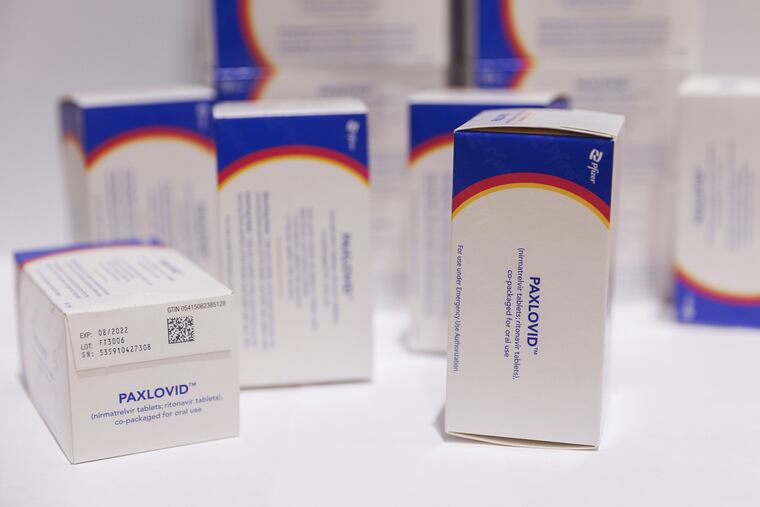COVID can come back after Paxlovid treatments, but Philly doctors say the drug’s still valuable
Doctors are sticking with Paxlovid despite reports of rebound cases.

With Philadelphia still in the throes of the latest COVID wave, area doctors are fielding questions about the link between a primary treatment option and rebound cases.
Still, they aren’t hesitating to prescribe the drug called Paxlovid for people at risk from infection.
Paxlovid, the brand name for the drug nirmatrelvir, is an oral antiviral treatment typically prescribed for people who have contracted COVID and are at high risk from the disease. The series of pills taken over five days reduces the risk of hospitalization and death by 89% if taken within five days of a person’s first symptoms, the drug’s manufacturer, Pfizer, has reported.
But in some cases, people are testing positive for COVID again two to eight days after finishing their Paxlovid treatments.
The Centers for Disease Control and Prevention says this is not alarming, and area doctors agree.
“Paxlovid is clearly very effective at improving symptoms, and we should still be prescribing it,” said Judith O’Donnell, chief of infectious diseases and chief epidemiologist at Penn Presbyterian Medical Center.
Pfizer reported in its May earning report that 2% of people who take the medication experience what are called rebound cases, but the Atlantic has reported that some doctors think the frequency is greater.
“We just tell people to quarantine for five more days and continue to wear masks in the development of symptoms,” said Alejandro Herrera, a doctor and infectious-disease specialist at the New Jersey-based Virtua Health.
Rebound cases are rarely serious, the CDC reported in a May 24 health advisory, and resolve within a matter of days. People whose infections rebound can transmit the virus, though it’s not clear if they’re as contagious as they would have been during their initial bout with the disease.
Why exactly COVID is returning for some people treated with the drug is unclear, but doctors noted that rebound cases of the virus are nothing new, and have been one of the confounding elements of the virus since the beginning of the pandemic.
“Even before Paxlovid was available, we’ve seen a lot of patients who were moderate to severe have a little bit of rebound symptoms a few days or weeks after the majority of symptoms,” Herrera said.
The Pfizer earnings report noted its study found rebound cases were no more common among people taking the drug than those who received a placebo, and noted incidents of recurrence “may have something to do with the virus itself.”
The drug may be in high demand right now with case counts still high around Philadelphia and the state. The city is reporting an average of 410 cases daily, a 4% increase from two weeks ago, and a daily average of 3,223 cases in Pennsylvania, down 24% from two weeks ago but still many more than were being reported during April’s COVID lull. New Jersey is reporting 3,778 cases daily, a 25% decrease from two weeks ago.
On Thursday, the CDC downgraded the risk from COVID in Philadelphia and Delaware and Montgomery Counties from high to medium, reflecting changes in case numbers, hospitalizations, and the number of available hospital beds.
After being in short supply in the early months of 2022, Paxlovid is readily available now. The government purchased 2 million doses of the drug and made it available at more than 35,000 sites nationwide, according to the federal Department of Health and Human Services.
Even while touting its availability, officials from the department said in May, prior to the CDC’s alert, that they were aware of the concern about rebound cases and consulting with the Food and Drug Administration.
Rebound cases don’t warrant another round of Paxlovid treatment, health officials have said. Anthony Fauci, the U.S. infectious-disease chief, said there would be studies looking at whether a longer series of Paxlovid treatment was needed.
Absent new data, several doctors in the Philadelphia region said they won’t change the way Paxlovid is used. The dosage prescribed now has been studied and shown to be safe, they said, and without further research responding to the possibility of a rebound case by prescribing a longer series could be risky.
“I would not in any way advocate for people to go off label, so to speak,” said O’Donnell of Penn Presbyterian Medical Center. “There’s no literature or scientific data to support that.”